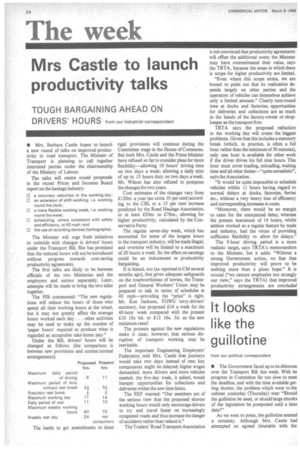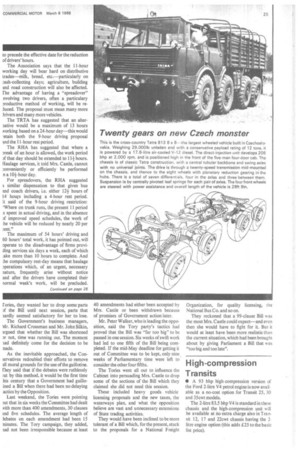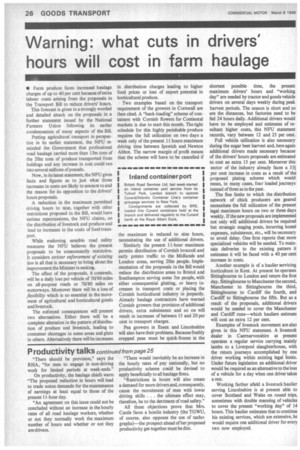Mrs Castle to launch productivity talks
Page 26

Page 27

Page 28

If you've noticed an error in this article please click here to report it so we can fix it.
TOUGH BARGAINING AHEAD ON
DRIVERS' HOURS from our industrial correspondent
• Mrs. Barbara Castle hopes to launch a new round of talks on improved productivity in road transport. The Minister of Transport is planning to call together interested parties under the chairmanship of the Ministry of Labour.
The talks will centre round proposals in the recent Prices and Incomes Board report on the haulage industry:
CI a voluntary reduction in the working day; o an extension of shift-working, i.e. working round the clock:
CI a more flexible working week, i.e. working round the week: CI scheduling, where consistent with safety and efficiency, at 40 mph: and CI the use of recording devices (tachographs).
The Minister will urge fresh initiatives to coincide with changes in drivers' hours under the Transport Bill. She has promised that the reduced hours will not be introduced without progress towards cost-saving productivity agreements.
The first talks are likely to be between officials of the two Ministries and the employers and unions separately. Later, attempts will be made to bring the two sides together.
The PIB commented: "The new regulations will reduce the hours of those who spend all their working hours at the wheel, but it may not greatly affect the average hours worked each day . . . other activities may be used to make up the number of 'paper hours' required to produce what is regarded as acceptable take-home pay."
Under the Bill, drivers' hours will be changed as follows (the comparison is between new provisions and current normal arrangements):
Proposed Present hrs. hrs.
Maximum daily period of driving 9 11 Maximum period of duty without rest break 51 51 Statutory rest break i 7 1
2
Maximum working day 11 14 Daily period of rest 11 10 Maximum weekly working hours 60 70 Weekly rest day 24 not compulsory
The battle to get amendments to these rigid provisions will continue during the Committee stage in the House of Commons. But both Mrs. Castle and the Prime Minister have refused so far to consider pleas for more flexibility—allowing 10 hours' driving time on two days a week; allowing a daily stint of up to 13 hours duty on two days a week. Mr. Wilson has also refused to postpone the changes for two years.
Cost estimates of the changes vary from £120m. a year (an extra 10 per cent) according to the CBI, to a 15 per cent increase predicted by the Road Haulage Association, or at least £50m. to £76m., allowing for higher productivity, calculated by the Conservative Party.
The regular seven-day week, which has accounted for some of the longest hours in the transport industry, will be made illegal; and overtime will be limited to a maximum of 20 hours a week. So the effect on earnings could be an inducement to productivity bargaining.
It is hinted, too (as reported in CM several months ago), that given adequate safeguards on the roadworthiness of lorries, the Transport and General Workers' Union may be prepared to talk in terms of schedules at 40 mph—providing the "price" is right. Mr. Ken Jackson, TGWU lorry-drivers' secretary, has proposed £16 a week for the 40-hour week compared with the present £10 18s 6d. to £12 16s. 3d. as the new minimum rates!
The protests against the new regulations make it clear, however, that serious disruption of transport working may be inevitable.
The important Engineering Employers' Federation told Mrs. Castle that journeys would take two days instead of one; key components might be delayed; higher wages demanded; more drivers and more vehicles needed; the five-day week, it added, would hamper opportunities for collections and deliveries within the new time limits.
The EEF warned: "Our members are of the serious view that the proposed shorter working hours would only encourage drivers to try and travel faster on increasingly congested roads and thus increase the danger of accidents rather than reduce it."
The Traders' Road Transport Association is not convinced that productivity agreements will offset the additional costs; the Minister may have overestimated their value, says the 11TA, because the areas in which there is scope for higher productivity are limited.
"Even where this scope exists, we are bound to point out that its realization depends largely on other parties and the operators of vehicles can themselves achieve only a limited amount." Clearly turn-round time at docks and factories, opportunities for deliveries and collections are as much in the hands of the factory-owner or shopkeeper as the transport firm.
TRTA says the proposed reduction in the working day will create the biggest problems. Given that this includes a statutory break (which, in practice, is often a full hour rather than the minimum of 30 minutes), only one hour is available for other work if the driver drives his full nine hours. This hour must cover loading, unloading, waiting time and all other duties—"quite unrealistic", sags the Association.
"It would be quite impossible to schedule vehicles within 11 hours having regard to normal delays at docks, factories, ferries etc., without a very heavy loss of efficiency and corresponding increases in costs.
"Moreover, there would be no margin to cater for the unexpected delay, whereas the present maximum of 14 hours, whilst seldom worked as a regular feature by trade and industry, had the virtue of providing sufficient flexibility to allow for delays."
The 9-hour driving period is a more realistic target, says TRTA's memorandum to the Minister, but it adds: "Without a strong Government action, we fear that improved productivity will prove to be nothing more than a pious hope." It is crucial ("we cannot• emphasize too strongly our view," says the TRTA) that improved productivity arrangements are concluded
to precede the effective date for the reduction of drivers' hours.
The Association says that the 11-hour working day will bear hard on distributive trades—milk, bread, etc.—particularly on :-.ash-collecting days; agriculture, building and road construction will also be affected.
fhe advantage of having a "spreadover" nvolving two drivers, often a particulary oroductive method of working, will be reduced. The proposal must mean many more drivers and many more vehicles.
The TRTA has suggested that an alternative would be a maximum of 13 hours
morking based on a 24-hour day—this would -etain both the 9-hour driving proposal and the 11-hour rest period.
The RHA has suggested that where a weak of an hour is allowed, the work period of that day should be extended to 1 If hours. Haulage services, it told Mrs. Castle, cannot :onveniently or efficiently be performed n a 10+-hour day.
For spreadovers, the RHA suggested a similar dispensation to that given bus and coach drivers, i.e. either 12f hours of 14' hours including a 4-hour rest period. [t said of the 9-hour driving restriction: 'Where on trunk runs, the present 11 period s spent in actual driving, and in the absence of improved speed schedules, the work of .he vehicle will be reduced by nearly 20 per :ent."
The maximum of 54 hours' driving and 50 hours' total work, it has pointed out, will operate to the disadvantage of firms provi ding services six days a week, each of which :ake more than 10 hours to complete. And he compulsory rest-day means that haulage operations which, of an urgent, necessary nature, frequently arise without notice and after the drivers have completed their normal week's work, will be precluded.
"There should be provision," says the RHA, "for men to engage in non-driving work for limited periods at week-ends."
On productivity, the haulage chiefs warn: "The proposed reduction in hours will lead to trade union demands for the maintenance of earnings at least equal to those of the present 11-hour day.
"An agreement on this issue could not be concluded without an increase in the hourly rates of all road haulage workers, whether or not they normally work the maximum number of hours and whether or not they are drivers. "There would inevitably be an increase in the hourly rates of pay nationally, but no productivity scheme could be devised to apply beneficially to all haulage firms.
"Restrictions in hours will also create a demand for more drivers and, consequently, cause the recruitment of men with lower driving skills . . the ultimate effect may, therefore, be to the detriment of road safety."
All these objections prove that Mrs. Castle faces a hostile industry (the TGWU, of course, also opposes the use of tachographs)—the prospect ahead of her proposed productivity get-together must be dim.




































































































































